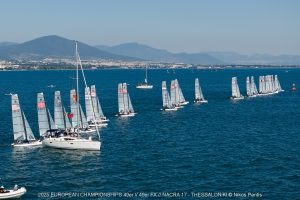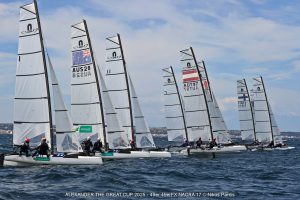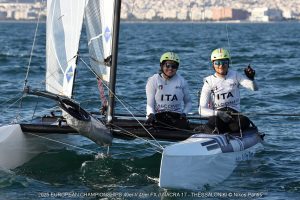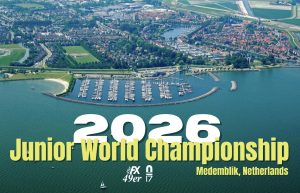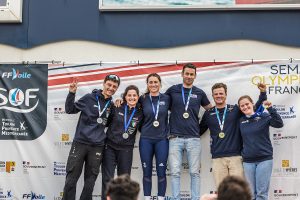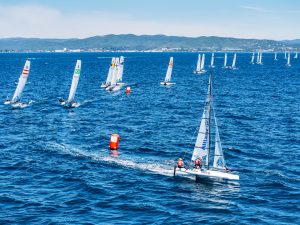He is the most experienced man in mixed multihull sailing on the Olympic Nacra circuit to date. Sebbe Godefroid (BEL) lead the way to this new discipline, by joining forces with Carolijn Brouwer in their bid for an Olympic medal in 2008 in the Tornado. On their way, they won silver at the 2007 ISAF Worlds in Cascais. It wasn’t an easy road with many bumps, which makes him a skilled coach for the Swiss team of two boats.
What experience s of your own mixed multihull campaign do you take along in coaching the Swiss?
“On our road to Beijing 2008, Carolijn and I encountered quite a number of problems that had little to do with sailing. You can hardly deny that a man and woman are different. Sometimes that might cause troubles if you constantly sit together on a boat and you both push yourself to the limit. We have worked very hard on that at the time and of course we learned a lot. In order to make a male/female team work, you need to keep several points in mind. So I try to use what I have learned from my campaign in this work.”
What have been your most important learning points?
“The main lesson is that men and women think differently and that you cannot change this. You have to learn to cope with it. For this, you have to recognize each other’s differences and try to take the advantage of it. Typical stereotype is that men are machos and women are less good at fiddling. There will be exceptions, but I think it’s mostly true. You can give a woman tips, but she will probably never really like working on the boat. And you can ask a man not to behave too macho, but he remains the same person from the inside. The main thing is to accept it and respect it. Also that you allow each other the freedom to stay yourself without irritating the other. If you approach this successfully, these might become your strengths.”
Did you receive help with this process?
“No, not currently. After London 2012, the Swiss federation has restarted and the project has certainly not been set up in the same way as the Dutch. The Dutch Yachting Association has of course made use of the fact that Nacra Sailing International is Dutch. They have addressed it well, making them number of advantages that other countries did not have. They are nearby the builder, so before the boats were available, for example, the Dutch sailors tested them. Therefore they have very clearly an edge now, but they invested quite well in this project. What is now going on at the Dutch Yachting Association, is pretty impressive. I think they really have done a lot of work.”
“Look at the Delta Lloyd Regatta for instance. Netherlands should have won it easily, if not Eurosaf came across with their ridiculous system. But everyone knows that the Dutch are the tough ones to beat.”
What is your approach to the Swiss Nacra 17 project?
“I consider the World Cup events and even the Worlds as not really important. These are essential in the meaning of good measurement moments, but not so much in terms of results. It is now crucial to get to know the boat, that she becomes an extension of the crews. That they feel the Nacra 17 as if they were walking or driving their car. When I look at the fleet at the moment, the Dutch team is the only one that has that control. They are really focusing on the racing, while the competition much more on the boat and themselves.”
How is your team doing?
“When I started working for the Swiss, I had never thought they would get this level so fast. Especially Matias and Nathalie are performing really well. You only have to tell them something once and it stays in place. That is very pleasant coaching. They are further in their process than they have ever been. On the other hand, the organizational part remains a bit tricky. The Swiss federation does not have the means and the habit to support athletes full-time. That means that my sailors have to work or study besides their Olympic program, which leaves too little time on the water. In our preparation for the Worlds we have tried to postpone that work a bit in order to spend more hours on the boat.”
“I think the coming winter will be crucial. Apart from the Dutch, most sailors in the class did not truly prepared enter this season. I therefore believe that it is important to get to know the boat during the winter months, to be able to focus completely on the racing next year. At the moment we face the problem with the organization around sailing. We are searching for the resources to be able to manage the program.”
What is your goal with your team?
“If our teams really want to reach the top, they need to sail at least twenty days per month. An Olympic campaign is just like an office job. You must be working on it five days a week. In addition, you should make sure that you do not have too many excesses and you should live as an athlete. This is the only way you can go for the medals. Concerning my team, they know what to do, just not how. Fortunately, a major sponsor might come soon. The motivation and understanding are there, but financially is the biggest limitation.”
Sebbe Godefroid is not present this week, as he already had commitments with the Belgian Youth F16 squad before he started his Swiss project at the end of March. The F16 Worlds are at the same time in Travemünde, Germany.
Text: Diana Bogaards

